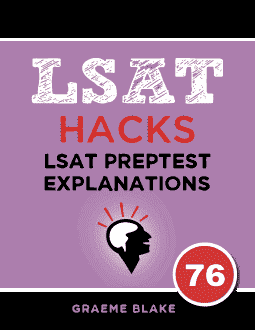QUESTION TEXT: If a corporation obtains funds fraudulently, then the…
QUESTION TYPE: Principle – Conform (Parallel)
PRINCIPLE: Corporations shouldn’t profit from fraud. If a corporation gained money from fraudulent funds, then the penalty must offset those gains.
ANALYSIS: It’s helpful to imagine examples. Suppose someone stole $1,000,000 from a retirement fund they were managing, and they profited $200,000 before they were caught.
This principle says that they should be charged the regular penalty + $200,000 to offset the profit. The more general principle is “If you do something bad, you shouldn’t get to profit from it.” So we need to look for a situation where someone is profiting from a bad thing.
___________
- There are no profits here. This doesn’t parallel.
- The company surely profited from violating pollution laws. But this answer doesn’t suggest fining the company to offset the profits.
- The situation was about someone who did a bad thing profiting from that bad thing. It’s not private profit per se that’s bad, as long as it’s a different private entity that profits.
- There’s no profit or offsetting profit here.
- CORRECT. The criminal did a bad thing. If they write a book, they’ll profit from doing the bad thing. So this answer correctly suggests offsetting that profit (by donating the proceeds to charity).


Hey Graeme, love your website and all the help they’ve given me. The entire second half of this LR section gave me trouble but this question in particular bothered me..
I eliminated E because it states that he was convicted, and wrote a memoir. Which to me means that no act of “fraud” was committed – He legitimately made money from his book that was based on his crime; but not the crime itself. There is nothing illegal about how he obtained this money. The “take into account the corporation’s use of those funds during the time it held them ” is completely taken away from this answer – he never held the money illegally for a period of time..
I eventually selected D as I interpreted it to mean the performance enhancing substances allowed for – Fraudulent athletic gains – which potentially enhanced that athletes position or competition standing- (mirroring the corporation), and now that athlete is banned from ever competing , IE can never take advantage of the position he advanced himself into fraudulently. (Think: Lance Armstrong: Fraudulently won several tours; if he is allowed to ever compete again while clean, he is still benefiting from what he gained fraudulently).
For parallel questions, the important part isn’t to focus on the issues in the stimulus but rather, the structure of the stimulus. So, the correct answer doesn’t have to deal with “fraud” exactly. The gist of the structure is as thus: 1) Someone did something bad that put him/her at an advantage; 2) Their penalty should completely offset the advantages he/she gained from having committed that first bad act.
Let’s look at E. 1) He committed crime and by writing the memoir, is profiting off that crime; 2) Thus the book’s proceeds should be donated so that he loses all the advantages that his “bad act” brought him.
D is incorrect because the stimulus doesn’t use language like “all” or mention the future. Neither of these two items is present in the original stimulus so that makes this answer wrong. It would be more correct if D said: “If an athlete used substances, then all his medals/money he made from sponsorships should be taken away.”
I’m confused about how in E) we can be sure that the convicted criminal obtained the funds from the memoir “fraudulently.” The text of the answer says “If a convicted criminal writes a memoir describing the details of that criminal’s crime…” and I interpreted this as being compatible with the situation in which a noteworthy criminal who has served time writes a memoir reflecting on the crime they committed after being released from prison. In this case, I believe one could argue the criminal is not obtaining proceeds from the book in a fraudulent manner since they are simply selling a book they wrote about their life story, which includes information on a crime for which they have already been convicted. I recognize that this still seems to be the best answer compared to the other options, but I still feel it doesn’t necessarily conform to the principle particularly well…am I missing something? Thanks.
Fraud isn’t essential. We’re just looking for an analogous situation. Fraud is bad, and so is crime. So a criminal profiting from crime is analogous to a corporation profiting from fraud. Fraud is a type of crime.
Analogies can be a level up in generality and don’t need to match on specific points.
Note: This is an old comment but I wanted to clarify the point.